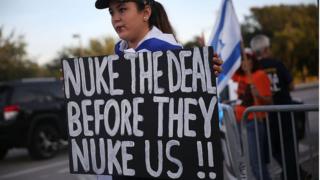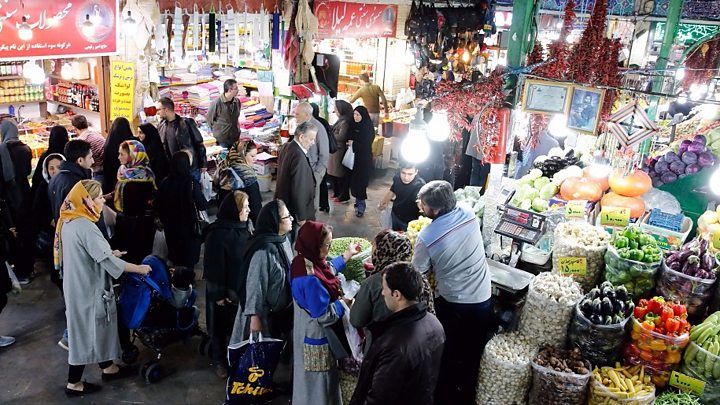Home » Middle East »
Is the Iran nuclear deal finally dead?
Is the Iran nuclear deal dying by a thousand cuts, or is it actually dead already and nobody will quite admit it?
The United States abandoned the agreement just over a year ago. Iran is now progressively breaching its terms, first by storing more low-enriched uranium than it is allowed to hold, and now by upping its enrichment level beyond the 3.67% purity set out in the deal.
It promises to keep breaking additional elements of the agreement until such time as its concerns are met.
The message from Tehran is simple. The Iranians insist that until this month they have been fully complying with the agreement, known as the JCPOA.
That – despite claims to the contrary from the White House – is a view confirmed by the UN’s nuclear watchdog, the International Atomic Energy Agency (IAEA).
But the re-imposition of US sanctions means that the Iranian economy is hurting badly. The Iranians say they are not getting the economic benefits of the agreement. And they want the Europeans in some way to relieve the pressure.
The Europeans – essentially Britain, France and Germany – are in a bind, caught between Washington and Tehran.
They want the agreement to continue. They have established – albeit at a ponderous pace – a mechanism for facilitating payments to Tehran for humanitarian goods not covered by the US sanctions.
But this is not enough for Iran. It wants the key sectors of its economy like oil and metals to be relieved from US pressure and that the Europeans cannot do. Their efforts are well-meaning but amount to little more than a diplomatic gambit to show support for the nuclear deal.
It is at the end of the day individual companies that must decide to take the risks and trade with Iran, not governments.
This is the situation that clearly was always going to happen once President Trump walked away from the deal. While the US and its key European allies are at loggerheads over the JCPOA, the reality is that they share many of the same concerns about Iran: its nuclear activities; its missile programmes; and its wider regional behaviour.
The sporadic crisis in the Gulf, with attacks on oil tankers, the shooting down of a US drone and so on, only accentuate these fears.
But two very different strategies – if you can call them that – are in play here.
The initial approach was that of the Obama administration and its allies – along with Russia and China – that brokered the nuclear deal in the first place.
Iran’s nuclear programme was proceeding. It may have given up an explicit military dimension, but it had the know-how and the ability to re-start it very quickly.
The aim was, through agreement, to constrain and limit its nuclear activities for a period of time. The agreement was far from perfect, but it was seen at the time as better than no deal. And that is still the view of all of its signatories except the Americans.
The idea was, if you like, to kick the nuclear can down the road; to delay the moment of crisis. (And remember before the nuclear accord was signed there were real fears of a US or Israeli military strike to destroy Iran’s nuclear infrastructure). In the meantime it was hoped maybe something would change in Iran.
For President Trump the whole deal – President Obama’s deal – was anathema. He just wanted out. Instead he is pursuing a policy of “maximum pressure” whose goal is unclear.
Some more hawkish voices in his Administration would welcome regime change in Tehran. Others argue that the goal is to force the Iranians to the negotiating table to swallow a new, much more restrictive nuclear deal.
Beyond the US even its allies wonder what is going on in the president’s mind. The recently leaked documents from Britain’s ambassador to Washington, in which he branded the Trump administration’s Iran policy “incoherent, chaotic”, make this crystal clear.
All this of course raises the question, just how many breaches can you have before the document becomes worthless?
Put another way, at what point do you give up pretending that the nuclear deal has a future and start to grapple with the potential consequences of its demise?
The Europeans are struggling to keep the JCPOA alive. Iran may well have misjudged their capacity to compensate for American pressure.
French President Emmanuel Macron has skilfully down-played Iran’s latest breach by announcing a week of consultations to try to get talks renewed between all of the players. The Iranians even say the US can participate in these talks if they lift the sanctions.
But there is probably little to no chance of that.
In setting another 60 day deadline for action Iran is trying to control the pace at which this crisis develops. And it is hard to see what benefit there would be for Tehran to abandon the deal entirely.
However it is hard to see anything much changing. Europe’s approach is akin to that illustrated in a well-known British childrens’ film where a toy train is hurtling towards the end of the line and one of the characters desperately keeps on placing one more piece of track in its path to avert disaster.
For the Europeans the question is when will the track run out.
Source: Read Full Article




